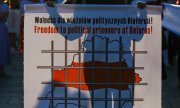Belarus two years after the mass protests
It has been two years since long-time ruler Aleksandr Lukashenka declared himself the winner of the presidential election in Belarus, even though according to the opposition and international observers, Svetlana Tikhanovskaya had probably won. The ensuing mass protests were violently suppressed, and Lukashenka is still in power rule today. Europe's press takes stock.
In the footsteps of Solidarność
The democracy movement is on a good path, Krytyka Polityczna believes:
“Belarusian society has made its mark in 2020, it has taught long-term resistance, it has created free media and a strong diaspora, which is always a great support. Now, perhaps for the first time in history, Belarusians are being handed weapons. There are several Belarusian battalions fighting in Ukraine, whose courage and successes on the battlefield are already legendary. ... In 2020, the Belarusian opposition had nothing. ... Today it doesn't seem to stand a chance. Just as Poland didn't seem to stand a chance in 1983 after the dissolution of Solidarność. It took years for a major shift to occur, but in the end it finally did. The Belarusians are on the same path.”
Repression has triumphed
All hopes have been dashed, LRT laments:
“Two years of repression have fundamentally changed Belarusians' perception of the prospects for democratisation and aid from the West. After two years, the special mechanism of the United Nations High Commissioner for Human Rights (OHCHR) has unfortunately shown no tangible results. ... The victories against the protesters encouraged the security forces to redouble the pressure on civil society. Protesters and their relatives were arrested, beaten, interrogated, slandered and persecuted, and their homes were raided. Hundreds were punished, placed under arrest and charged with crimes. Those who were able to flee have left the country.”
Support the opposition
The struggle for freedom deserves stronger solidarity from the EU, says Dagens Nyheter:
“We can do more for their cause, just as we can do more for Ukraine. They need our help. Some measures are easier, such as that the EU should regularly evaluate the situation in Belarus. Others are more challenging, such as ending all imports of Russian gas - even if that means facing tougher times. Because if there's one area where we're often naive, it's in foreign policy. But if we don't learn now, when will we finally realise what the terrorist regimes in Russia and Belarus are capable of?”

